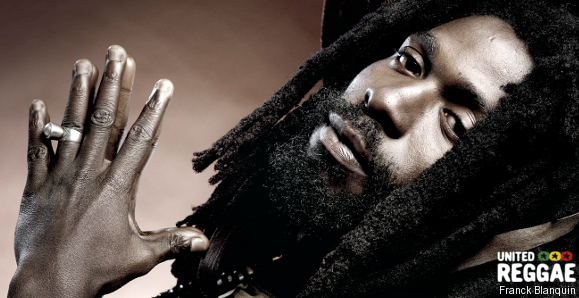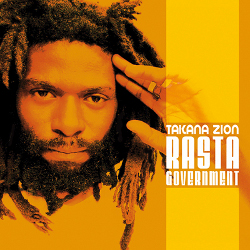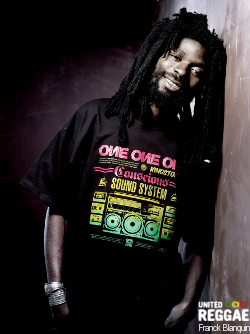Articles about reggae music, reviews, interviews, reports and more...
Interview: Takana Zion
- Home
- Articles
- Interviews
- Interview: Takana Zion

Interview: Takana Zion
"I wanted to be worthy of working with all these big names in reggae, in this mythical place that is Harry J studio"
Sampler
Takana Zion is a young Guinean artist whose third album, 'Rasta Government' (Soulbeats), came out last May. Having recorded his previous albums in Paris and Bamako with the help of producer Manjul, he decided to record his latest one in Jamaica, at Harry J studio. As spiritually committed as ever, his music has taken on a more roots sound thanks to the influence of the Jamaican musicians he worked with on this album.

Last year you released your new album, 'Rasta Government', which you recorded in Jamaica. How was this album conceived?
This album is the logical continuation of my previous albums. I was already thinking about going to Jamaica during the recording of the second album. I met Samuel Clayton of the group Mystic Revelation of Rastafari, who worked with me as concert sound engineer. We toured together. Samuel completely changed my whole live sound. Everything went off very smoothly.
Then I invited him to visit me in Guinea to do the same show there. It was a hard time because 200 young Guineans had just been killed in a stadium. But Samuel was brave. As the eldest member of our group, he encouraged the musicians.
Then we decided to do an album in Jamaica. I had the songs, he had the contacts and the studio.
How did you compose this album? What was it like collaborating with the musicians?
It all happened very naturally. I played them the melodies and chords I had in my head, and they suggested arrangements for the different tracks. I didn’t have to say anything. The music spoke for itself.
Then I meditated to find beautiful words right there in the studio. I don’t even write my words down on paper. I just let myself be guided. Jah tells us when the time comes to speak. You don’t have to worry. It all comes naturally.
 Jah tells us when the time comes to speak
Jah tells us when the time comes to speak
Your recorded this album at legendary Harry J studio, a mythical place in the history of reggae, where Bob Marley and Burning Spear recorded. Did you feel special vibes during these sessions? Didn’t you feel some pressure?
I felt a lot of pressure before I went to record in Jamaica. I’d always been drawn to this country. Even though I’d never been there, I’ve always felt very close to it spiritually. I listen to lots of music made on the island, and also read lots on the topic.
I wanted to be worthy of working with all these big names in reggae, in this mythical place that is Harry J studio. I wanted to carry out my mission. Thanks to God, I think we succeeded.
Three years ago Sam “Junior” Clayton became your music director. How is it working together?
He’s a man with a lot of experience, who’s worked with the likes of Burning Spear and Steel Pulse—just the man to help a young artist like me. He’s here to guide me.
On the album you do a track - “Glory” - together with Capleton. What was it like meeting him?
 Before going to Jamaica, a friend of mine named Black Man mentioned me to Capleton. So when I arrived on the island, Capleton generously opened his door to me. We ate together, meditated together and shot the clip. It was a really intense experience for me, as a young African artist who’s appreciated Capleton’s music for a long time.
Before going to Jamaica, a friend of mine named Black Man mentioned me to Capleton. So when I arrived on the island, Capleton generously opened his door to me. We ate together, meditated together and shot the clip. It was a really intense experience for me, as a young African artist who’s appreciated Capleton’s music for a long time.
In the song “Glory” you pay tribute to the great figures of the cause. Do you the younger generations need to be reminded?
You always have to look behind you. Haile Selassie got rid of the inferiority complex I had in me. I might have of wasted my time and missed my life instead of becoming a new man. He guided me from the ghettos of Conakry to the hills of Bamako and stopped me from falling into the traps that the African youth so often falls in.
 You always have to look behind you. Haile Selassie got rid of the inferiority complex I had in me
You always have to look behind you. Haile Selassie got rid of the inferiority complex I had in me
The tribute is obvious, because I have to thank him for giving us the force, as well as Marcus Garvey for these prophecies that gave us the vision and Emmanuel, who is a holy who devoted his entire life to Rastafari.
What’s your view on the African reggae scene?
Reggae is really taking off in Africa. Lots of young people are taking up this music. But we need infrastructures and good producers. Over there, there’s a real lack of information about what’s going on in reggae. We need sound systems and labels. Things need to fall into place.
I want to work with Guinean artists. I had a compilation project that fell through due to time constraints. But I’m currently building a studio in Guinea so that I have a place to work with young people
Some of your albums, like 'Black Mafia', were only released in Guinea. Can you explain why?
When I get home after a tour, I can’t stand to not be doing something. But if I record roots reggae, young people won’t be interested. So, to spread the message and the good vibes, I record more dancehall or R&B tracks. I want to make young people dance in wisdom. That’s why I put out albums like “Black Mafia” especially for the Guinea music scene.
On your first album you included some dub tracks. Would you like to continue on this path and do dubs of your new tracks?
 I really like it, but dub was the speciality of Manjul, with whom I collaborated on the previous albums. It also depends on the album. Certain riddims lend themselves better to dub because of their musical color. But I’m open.
I really like it, but dub was the speciality of Manjul, with whom I collaborated on the previous albums. It also depends on the album. Certain riddims lend themselves better to dub because of their musical color. But I’m open.
You started your career in rap. How did the transition to reggae and Rastafarianism take place?
It depends on the movements of the heart at a given time of your life. When you’re young, you want faster sounds. The American music scene influenced Guinean youth, the same way that French rap between 1996 and 1999 had a strong impact on some young Guineans. It was at a time when I was asking myself a lot of questions about myself, the African people and its origins. I started meeting Rastas and they told me about Haile Selassie. I was a young African in search of spirituality and identity. I left my parents very early because I knew I couldn’t live the life I had chosen with them. I went to Mali, where I met Tiken Jah Fakoly, Manjul and other brothers who helped me become who I am today.
Your latest album is called 'Rasta Government'. Do you think rastas have a role to play in politics?
Obviously, because there are lot of kids who go to school these days and who also listen to the message of Rasta. Later on they will be able assume their responsibilities within our society.
They are the future “Rasta Government.” We don’t just sing to entertain, but try to educate and convey positive energy. We need to surpass ourselves—for our continent. Rasta provides us with spiritual independence. The people need to trust in him. Rasta pushes us towards love and unity.
 Rasta provides us with spiritual independence. The people need to trust in him
Rasta provides us with spiritual independence. The people need to trust in him
How can people live without a living wage, enough to care for, feed and house themselves? There’s no more room for dictatorships in Africa and rastas have a role to play.
We must grow economically. The people must realize the importance of getting involved in this area. We also must not be afraid of diversity. They say the world has become a “global village” because of globalization. We are workers, the builders of the divine creation, and we intend to fully assume our role in maintaining positivity on Earth. One Love.
Translated from French by Jessica Strelec
Read more about this topic
Read comments (2)
| Posted by Makaveli on 04.02.2012 | |
| Takana Zion, big up to you. Wontanarra. | |
| Posted by NEWTON BALDE on 08.24.2012 | |
| GOD PLAISE UNITED STATE OF AFRICA! | |
Comments actually desactivated due to too much spams
Browse by categories
Recommended Articles
Latest articles
Recently addedView all
© 2007-2026 United Reggae. All Rights Reserved. Reproduction in whole or in part is prohibited. Read about copyright
Terms of use | About us | Contact us | Authors | Newsletter | A-Z





















